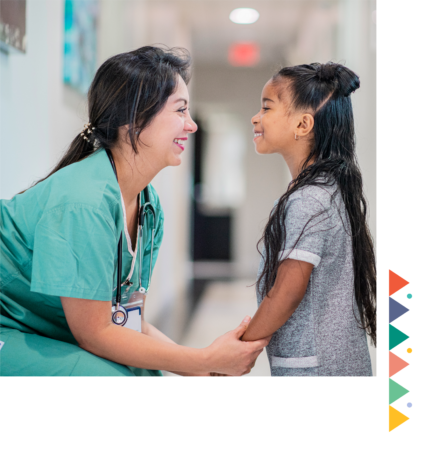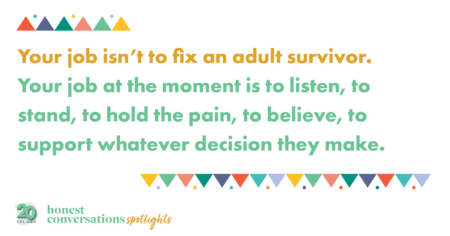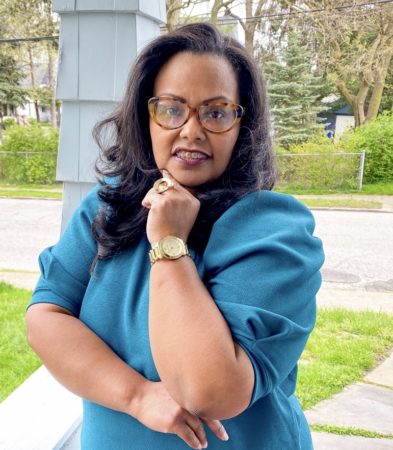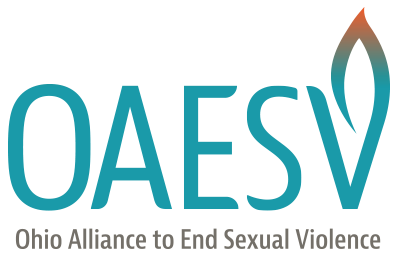Darkness to Light Spotlight: Supporting Hispanic Survivors
Darkness to Light
This blog originally appeared on the blog of Darkness to Light, an amazing organization working to end child sexual abuse, as part of their Hispanic Heritage Month spotlight. Read the original post here.
This week we sat down with Rosa Beltré to discuss the nuances and best practices of supporting Hispanic survivors of child sexual abuse.
Rosa serves as the Executive Director of the Ohio Alliance to End Sexual Violence, a state-wide coalition that advocates for comprehensive responses and rape crisis services for survivors and empowers communities to prevent sexual violence. Rosa is action driven, passionate about empowering Women of Color, enriching the life of others, and provoking change.
D: Tell us a little bit about your background.
R: I am afro-latinx-taina. I was born in the Dominican Republic, I came to the states when I was 4 years old and migrated with my mother to reunite with my dad, who had been in the States since before I was born. I lived in a predominantly Hispanic Community in Queens New York, and my parents ensured that we never forgot our culture or language. This way we could still communicate with grandparents and family back in the homeland. I worked many years in corporate America as vice-president of community relations and continue to be very connected with the communities (Florida, NY, Columbus and Cleveland). I am passionate about seeing survivors thrive, and understand that they are not their victimization, and know that they can gain power and their voice again. I also promised myself that I would be a catalyst of change in this world, that I was going to fight hard every day so that my future generation is not another statistic.
D: What does culturally competent prevention look like in the Hispanic/Latinx community?
R: We should first change competency to humility or sensitivity, as no one is fully competent in any culture or topic. Culture is comprised of food, music, activities, religion, and sports. It also includes dialect and phrases, such as the Spanish phrase “que bacán,” which means “how cool.” We all say it a little differently; a friend of mine from Colombia says “que bacán,” while those of us from the Dominican Republic use “que bacáno” with an “O”. These phrases mean the same thing even though they’re slightly different. Even within a Latino country there are differences in dialect, but just because they’re different doesn’t make either one of them wrong.

Cultural sensitivity is defined as knowing that differences and similarities exist between cultures and that they do have an effect on our values, learning, and behavior.1 Being culturally sensitive allows you to understand that we may have different opinions or experiences and our backgrounds may be different than other people. Cultural sensitivity allows us to recognize these differences as simply differences. We can be looking at the same thing or person and have completely different approaches on how we view them. For example, a dog can be viewed in many different ways to different people. A dog can be considered a person’s best friend, or a purse accessory, or simply an alarm clock. We all tend to have our judgments based on our own experiences and what is meaningful to us.
Cultural sensitivity is important because, in the U.S., the Hispanic population is growing. Over 50% of people in California, Florida, and Texas are Hispanic. Furthermore, Pew Research projects that the percentage of Hispanics in the U.S. will dramatically rise from approximately 19% to 28% by the year 2050.2 The census reports that by 2050, the U.S. may have up to 102.5 million people that are Hispanic or Latino.3 That is approximately one in every four Americans that will speak Spanish.
It’s important to understand these dynamics so that we can engage the community in prevention strategies and do a good job of supporting Hispanic survivors.
D: What does it mean/look like to be an Active Bystander in the Hispanic community?
R: An active bystander is someone who takes steps to speak up, prevent escalation, or disrupt a problematic situation. In the Hispanic community this might be more complex than it sounds. Not everyone is safe to speak up or to intervene if abuse happens. There might be issues of legal documentation, power dynamics, job security, language barriers, or historical trauma with law-enforcement. Also, some in the community perceive the bystander to be a “snitch,” a busybody. There is also layer of “machismo.” Confronting machismo takes even more courage because it involves intervening when you see violence or the threat of violence. This is a tricky skill because you should not put yourself or others in harm’s way or respond to violence with more violence. Being a positive bystander involves finding safe ways to interrupt a violent or potentially violent situation, even when it involves strangers.

D: What type of support do child sexual abuse survivors need? Are there any nuances in supporting survivors in the Hispanic community?
R: Hispanic survivors, especially children, need caring and responsible adults. They need to be believed. Two things that advocates need to be ready to combat are false myths about sexual abuse and victim-blaming. Many people might think a child victim’s behavior is merely a tantrum or attention-seeking, but it’s actually a red flag. Child sexual abuse occurs in every country, in every community; it is a sad reality that within the Hispanic community it manifests a lot as incest, mostly in the home. In many cases, the victims are 12 to 24 years old. One descriptive study found that about 83% of Latina survivors report knowing their abuser, but a little less than half of them never actually reported the abuse to the police.4 Rape and sexual abuse are the most under-reported crimes in the United States, and when we add access barriers, language barriers, cultural barriers, immigration status barriers, these rates jump higher.
D: How do I be a good friend/relative/partner/ally/supporter to a Hispanic survivor?
R: Many survivors of sexual and relationship violence disclose their assault or abuse to only one other person, usually a friend. As a good friend/relative/partner or aspiring ally to an adult survivor, you can’t rescue your them or solve their problems. But being there to listen, believe, and support your friend in a positive way can greatly influence their healing process. Listen if they want to talk. Don’t allow your feelings or anger or sadness get in the way. Your job isn’t to fix the situation. Your job at the moment is to listen, to stand, to hold the pain, to believe, to support whatever decision they make. Be an ongoing source of reassurance to them- it wasn’t their fault! They need to hear that their fears, anxieties, guilt, and anger are all normal feelings and acceptable emotions. Here are a few more tips:
- Don’t be a therapist or a preacher! Be a FRIEND!
- Practice your own self-care so you can be there for them effectively.
- Educate yourself on the issues.
- Give them space to breathe.
- Allow them to feel their feelings; don’t contradict those feelings.
- Don’t touch, hugs, caress, etc. unless they initiate that touch as a form of comfort.
- Allow them to share as much as they want, and respect their privacy when they don’t want to share.
- Honor their recovery process.
- Don’t put words in their months, even if they don’t know how to articulate all that has happened.
- Let them know you are on their team.
- Be patient.
- Be present.
D: Is there anything else you think is important for readers to know on this topic?
R: 1 in 6 Latinas age 13 and older will experience sexual victimization in their lifetime.5 Most survivors, including those victimized as children, know their perpetrators. Latino women face substantial sexual victimization and other forms of victimization at each life stage. However, access to services are still weak. We can address these weaknesses by building on the strengths and cultural traditions of Latino women. We recommend using medical settings as an intervention point and educating the larger community of available services. That way family members and friends can educate each other.
References
1 Robinson, J. S., Bowman, R. P., Ewing, T., Hanna, J., & Fede, A. L. (1997). Building Cultural Bridges. Bloomington, IN: National Education Service.
2 Brown, A., & Lopez, M. (2020, May 30). Mapping the Latino Population, By State, County and City. Retrieved from https://www.pewresearch.org/hispanic/2013/08/29/mapping-the-latino-population-by-state-county-and-city/
3 US Census Bureau. (2018, August 03). Hispanic Heritage Month 2015. Retrieved from https://www.census.gov/newsroom/facts-for-features/2015/cb15-ff18.html
4 Brown, A., & Lopez, M. (2020, May 30). Mapping the Latino Population, By State, County and City. Retrieved from https://www.pewresearch.org/hispanic/2013/08/29/mapping-the-latino-population-by-state-county-and-city/
5 Bureau of Justice Statistics. 2004. National Crime Victimization Survey. Washington, DC: U.S. Department of Justice, Bureau of Justice Statistics.
This is blog #4 of “Honest Conversations: Spotlights,” focusing on the intersection of child sexual abuse in Hispanic communities. Honest Conversations is a Live series from Darkness to Light where experts have a variety of authentic discussions about the realities of stigma and child sexual abuse. Click here to read Blog 1, Blog 2, or Blog 3 in this series.

Rosa Beltré, BA, RA is the Executive Director of the Ohio Alliance to End Sexual Violence. An ordained Minister and the Regional Social Service Director of her Faith community, she serves as a facilitator, training consultant and keynote speaker for organizations who seek her expertise in understanding abuse through the Eyes of the Bible, Latino Cultural Humility and bridging the gap between faith base organizations, community agencies and this movement. Rosa has spent the last 15+ years training, cultivating community relations, providing development to organizations and communities focused on Fair Housing, Child Abuse, Sexual Assault/Abuse, Volunteerism, Financial Literacy, Church Call to Action, among others. Rosa uses her passion and experience to develop and sustain relationships with leaders in the field, as well as key stakeholders within the state and federal government.
She is a 2018 Women WELDing the way honoree and currently Co-Chairs the Women of Color Caucus of the state of Ohio for Sexual Assault and Domestic Violence. She is also the Co-Chair of the Family Violence Prevention Statewide Committee, Co-Chair of the Sexual Assault Advisory Board and member of the Human Trafficking Board and Sexual Assault Kit Initiative Board of the State of Ohio.

